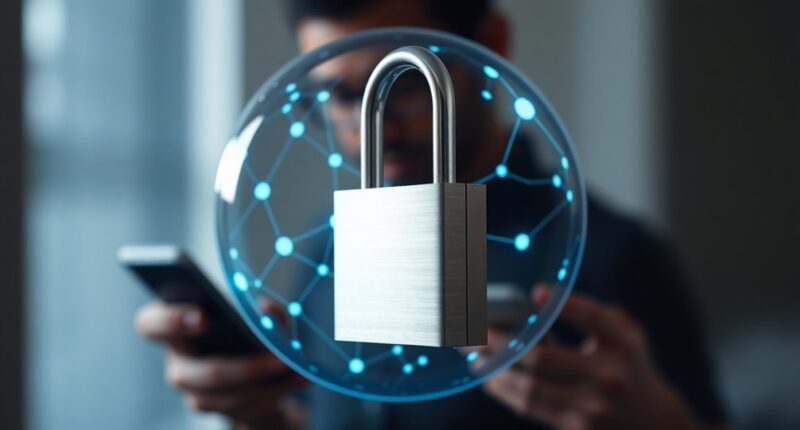End-to-end encryption is like a secret handshake between you and your friend. It scrambles your messages into a mix that only you two can unlock. This means while your message travels through the internet, no one else can peek at it—not hackers, not even the app you're using! It keeps your conversations safe and private. Imagine sending a postcard versus a sealed letter; with end-to-end encryption, you're always sending that sealed letter! It's a powerful way to protect your personal info and keep your online chats confidential. Stick around, and you'll uncover even more about how this works!
Key Takeaways
- End-to-end encryption (E2EE) ensures that only the communicating users can read the messages, preventing unauthorized access during transmission.
- In E2EE, data is encrypted on the sender's device and only decrypted on the recipient's device, safeguarding privacy throughout the process.
- It protects sensitive information, such as personal messages and financial data, from potential eavesdroppers, including service providers and hackers.
- E2EE utilizes strong encryption algorithms, making it extremely difficult for anyone without the proper keys to access the data.
- Popular applications like WhatsApp and Signal employ E2EE to enhance user privacy and secure communication against unauthorized interception.
Encryption Fundamentals Explained
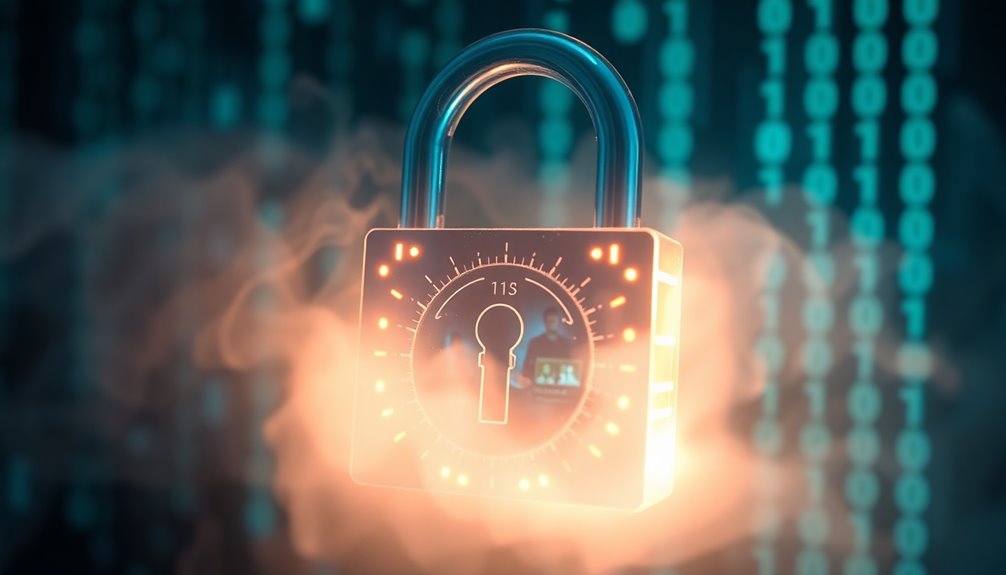
When you think about protecting your digital information, encryption is one of the most effective methods available. It's like locking your secrets in a special box that only you can open! Encryption works by scrambling your data using a unique key, turning it into unreadable code.
There are two main types: symmetric and asymmetric. Symmetric encryption uses the same key to lock and unlock your data, while asymmetric encryption uses a pair of keys – one public for locking and one private for unlocking. This way, you can share the public key openly but keep the private key safe. By understanding these basics, you're taking a big step toward keeping your information secure and private! Furthermore, data breaches can result in identity theft and significant financial loss, making encryption even more essential.
Understanding Encrypted Communication
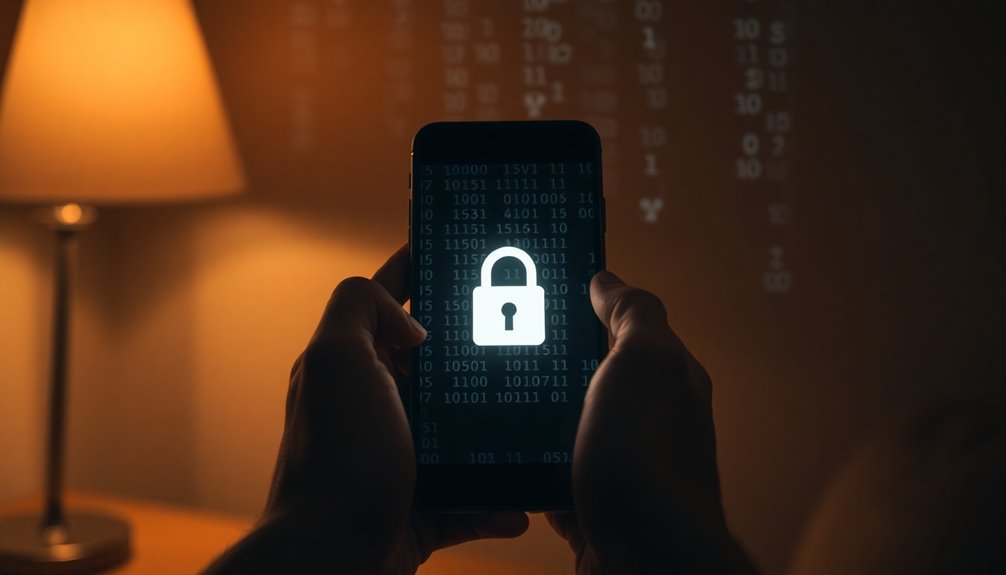
While you may be familiar with the concept of encryption, understanding encrypted communication is essential for truly protecting your digital exchanges. This process encodes your messages so that only the person you want to read them can decode them.
Think of it as a secret code that keeps your conversations safe from prying eyes. Encrypted communication is widely used in emails, messaging apps, and file transfers to prevent unauthorized access and hacking. This method safeguards confidentiality and integrity in transit, protecting against unauthorized access and hacking attempts.
When you send a message, it gets scrambled into unreadable characters, and only the right key can unlock it. This ensures your sensitive information, like passwords and personal data, stays confidential.
Data Transmission Process Explained
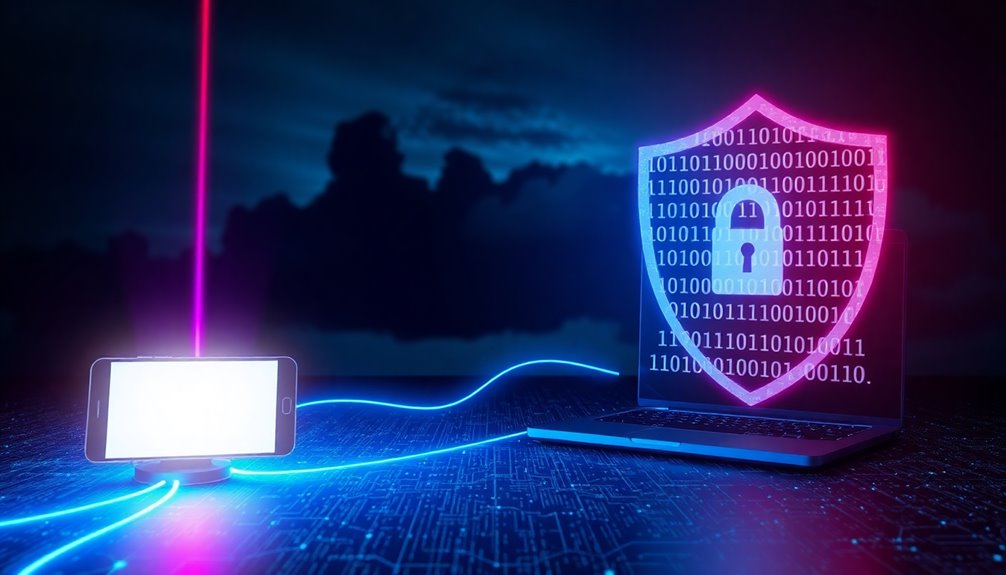
Understanding how encrypted communication works sets the stage for grasping the data transmission process.
Data transmission is all about sending information, like messages or files, from one device to another. You can use wired methods, like fiber cables, or wireless methods, like Wi-Fi. Data encoding plays a crucial role in ensuring that the information is formatted correctly for transmission.
There are two main types: synchronous and asynchronous transmission. Synchronous sends data in a continuous flow, while asynchronous sends it one character at a time, using special bits to keep everything in sync. Think of it like a conversation where one person speaks at a time!
Factors like bandwidth and latency affect how fast and accurately your data travels. All these details help ensure that your information gets to its destination safely and efficiently.
Pros and Cons of Encryption
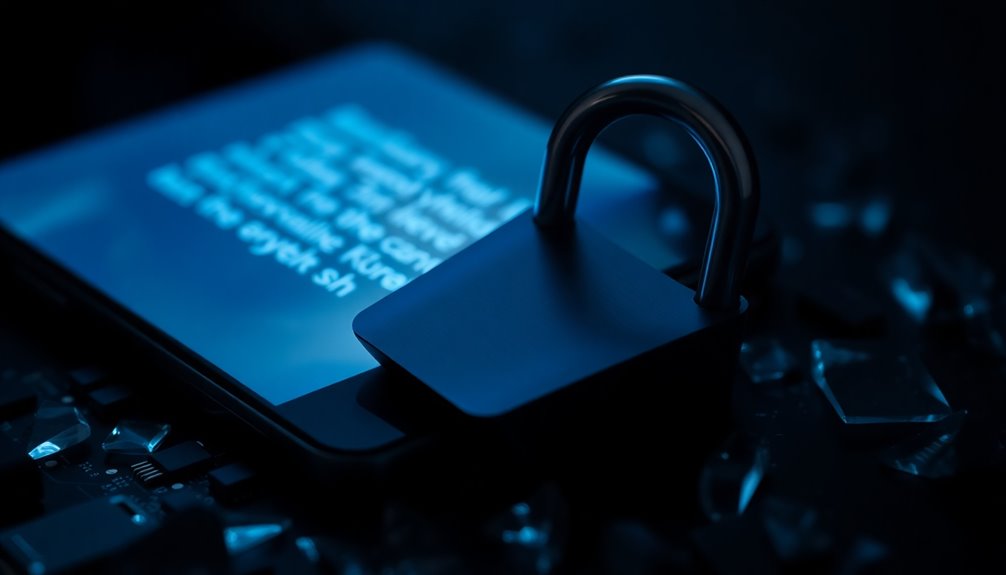
Encryption offers significant benefits alongside its drawbacks. On one hand, it keeps your personal data safe from prying eyes, protecting everything from trade secrets to sensitive information. This added layer of security helps businesses comply with strict regulations, ensuring they follow laws like HIPAA and GDPR. Additionally, encryption is fundamental for ensuring data integrity as it maintains the accuracy of datasets, which is vital for industries like AI and ML.
However, it can also be costly and complex. Setting up encryption systems often requires expensive hardware and specialized knowledge, making it tough for some to manage. Plus, if you lose your encryption keys, you might lose access to your data forever!
Encryption vs. Regular Communication
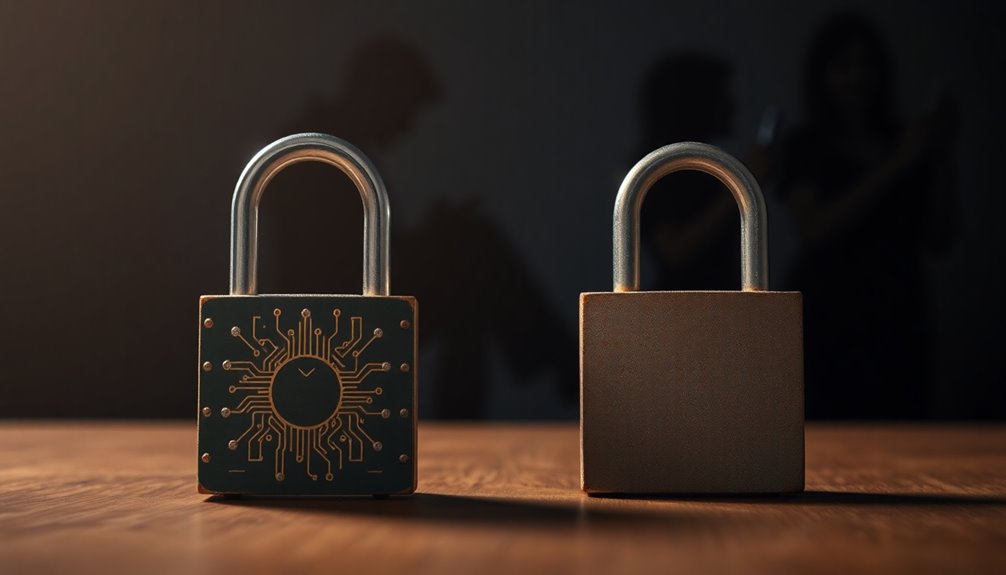
When you compare encrypted communication to regular communication, the differences in security become strikingly clear. In regular communication, anyone can intercept your messages, leaving your personal information vulnerable.
But with encryption, your messages transform into unreadable codes, making them safe from prying eyes. End-to-end encryption (E2EE) is like sending a secret letter that only you and your friend can read. Only you two hold the keys to unlock the message!
In contrast, other methods, like client-to-server encryption, let servers see your messages, which isn't as secure. This extra layer of protection not only keeps your conversations private but also builds trust, allowing you to share sensitive information without fear. Additionally, symmetric encryption is often faster, making it a practical choice for many applications, but the security of end-to-end encryption provides unparalleled confidentiality.
Isn't that reassuring?
Security Vulnerabilities in Encryption
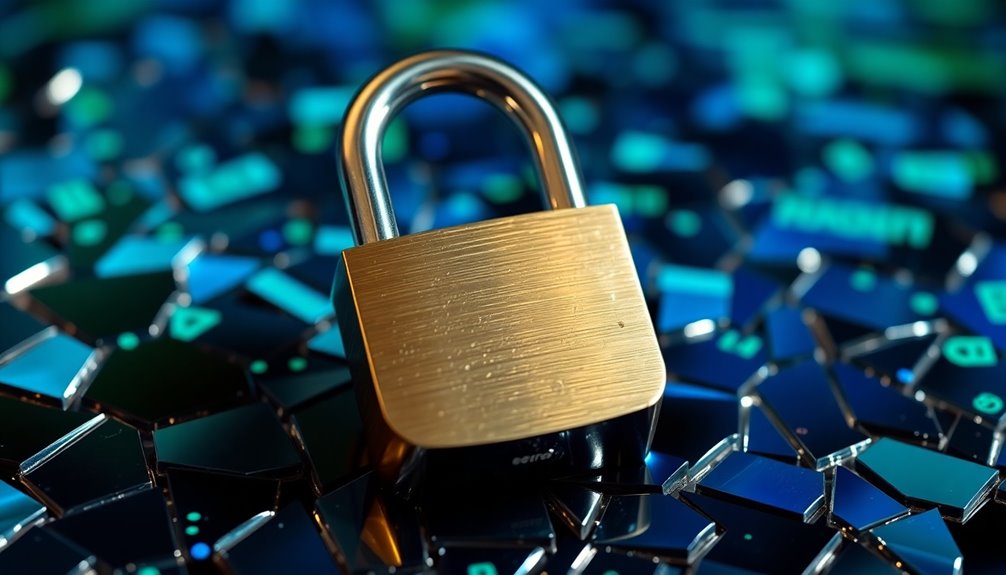
While end-to-end encryption offers robust protection for your communications, it isn't immune to vulnerabilities. Weak encryption algorithms, like outdated ones, can be cracked more easily than you think. Imagine someone finding two files that look identical but are actually fake; that's a hash collision attack! Key management is also crucial—if you store keys in the wrong place, like a poorly guarded closet, attackers can sneak in. Moreover, relying on outdated encryption methods increases the risk of successful cyber attacks. Plus, using old protocols like SSLv3 leaves you open to threats. It's like using a rusty lock on your front door! Finally, incorrect implementation, such as not handling padding well, can let bad guys peek inside. Staying updated and aware is vital to keep your information safe.
Emerging Encryption Technologies
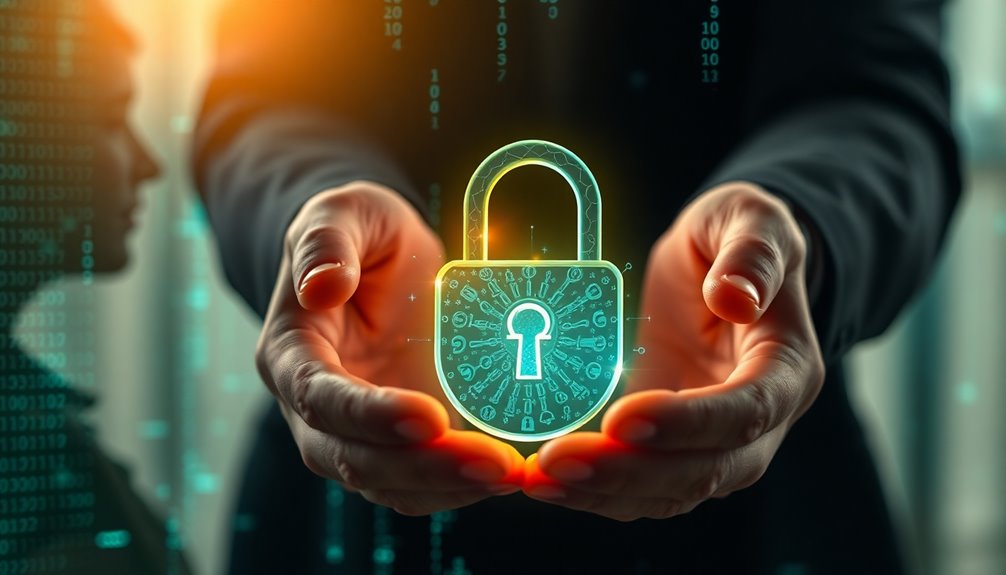
As cyber threats evolve, emerging encryption technologies play a crucial role in safeguarding your data. One standout is the Advanced Encryption Standard (AES), which is like a strong lock used by governments and businesses worldwide. Then there's RSA encryption, which uses a public-private key pair, acting like a secret handshake for secure communication. If you want something faster and equally secure, check out Elliptic Curve Cryptography (ECC), which offers high protection with shorter keys. Finally, quantum-resistant encryption methods are being developed to protect against future threats from powerful quantum computers. These innovations work together to keep your information safe and secure, so you can feel confident sharing your data online. Additionally, the development of quantum-resistant algorithms is vital for ensuring long-term data confidentiality against emerging challenges.
Use Strong, Unique Passwords
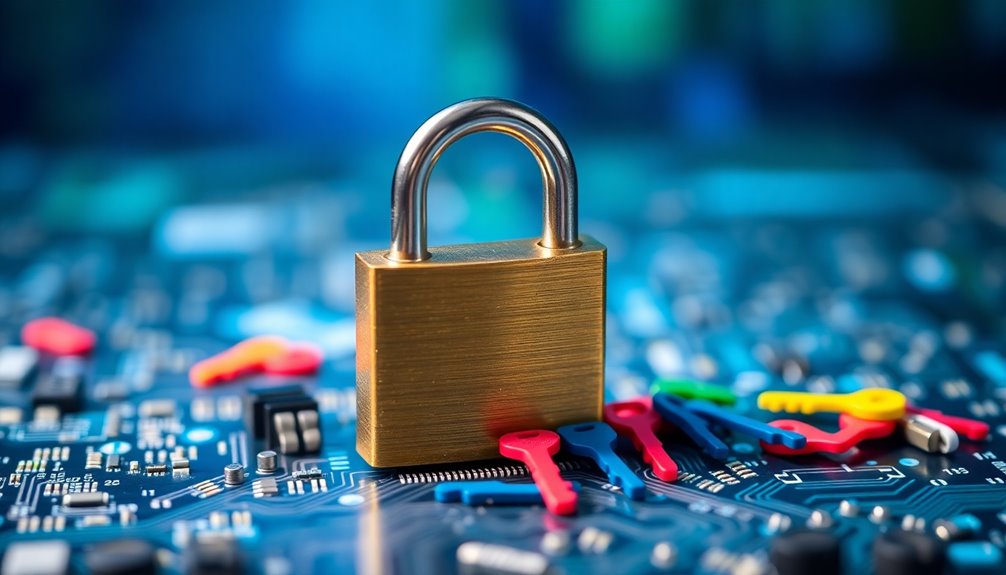
Emerging encryption technologies provide a strong foundation for online security, but they can't replace the importance of using strong, unique passwords.
To keep your accounts safe, create passwords that are at least 8 characters long and mix uppercase letters, lowercase letters, numbers, and special characters. Avoid using easily guessable information, like birthdays, and consider a memorable phrase made of unrelated words. Weak passwords account for 81% of data breaches, highlighting the need for robust defenses against evolving cyber threats. During major outages, the risk of cybersecurity vulnerabilities increases, making it even more crucial to have strong passwords in place.
Using a password manager can make this easier, helping you generate and store strong passwords securely. Plus, unique passwords for each account protect you from credential stuffing attacks.
Remember, strong passwords help keep your personal and financial information secure, preventing identity theft and ensuring your money stays safe.
Take charge of your online security today!
Frequently Asked Questions
How Does End-To-End Encryption Protect My Messages?
End-to-end encryption keeps your messages safe by turning them into secret codes that only you and the person you're messaging can read.
When you send a message, it's locked with a special key on your device. Even if someone tries to peek while it travels across the internet, they can't understand it.
Only the intended receiver, using their unique key, can unlock and read your message, ensuring your conversations stay private and secure!
Can Law Enforcement Access My End-To-End Encrypted Data?
No, law enforcement can't access your end-to-end encrypted data easily.
When you send a message, it gets scrambled into a secret code that only you and the person you're messaging can read.
Even if the police have a warrant, they can't unlock your messages because the service providers don't hold the keys.
This keeps your conversations private and secure, making it tough for outsiders to snoop.
Your privacy matters!
What Happens if I Lose My Encryption Keys?
Did you know that losing your encryption keys can make your data completely unreachable? If you misplace those keys, your important files may stay locked away forever!
To avoid this, consider creating backup keys or using multiple custodians to help recover them. If you don't have a solid plan, you could face hefty fines or even lose your business.
Are All Messaging Apps Using End-To-End Encryption?
Not all messaging apps use end-to-end encryption (E2EE).
While popular ones like Signal, WhatsApp, and Messenger prioritize your privacy with E2EE, others might only offer partial encryption.
This means your messages could be accessible to third parties.
It's essential to check each app's security features to ensure your conversations stay private.
Keeping your information safe is super important, so always choose apps that protect your messages from prying eyes!
How Can I Verify if a Service Uses End-To-End Encryption?
To verify if a service uses end-to-end encryption, you can start by checking if they generate unique public and private keys for users.
Look for details on how they handle message encryption and whether they allow you to control your private key.
It's also important to see if they've an integrity check to ensure messages aren't altered.
Lastly, ensure the provider is transparent about their encryption practices and doesn't access your messages.
Conclusion
Now you know that end-to-end encryption is like sending a secret message in a locked box, only the person you trust can open it! This keeps your conversations safe from prying eyes. As technology grows, staying informed about your privacy is super important. So, remember to use strong, unique passwords and share your knowledge with friends. By doing this, you're not just protecting yourself; you're creating a safer digital world for everyone. Keep chatting, but stay secure!
